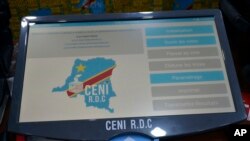Congo's deputy prime minister said Saturday that tablet-like voting machines for December's election had been made to order and would finish arriving this month, despite suspicions by diplomats and the opposition that
they might enable fraud.
President Joseph Kabila, in office for 17 years, is due to step down after a vote scheduled for Dec. 23 to choose his successor.
The election, which was meant to happen before Kabila's mandate expired in 2016, had been delayed for so long that many doubted it would happen. If it goes ahead, it will be Democratic Republic of the Congo's first peaceful transition of power since independence from Belgium in 1960.
This year, crucial milestones of the calendar — such as candidate registration — have been passed on time.
Vice Prime Minister and Security Minister Henri Mova Sakanyi said in a statement that 180 containers from South Korea with the voting machines in them "are on the sea." He said 15 had already arrived and the rest would arrive by the end of October.
The introduction of electronic voting and the authorities' exclusion of a number of candidates from the ballot — such as exiled opposition leader Moise Katumbi and former Vice President Jean-Pierre Bemba, an acquitted war crimes suspect — have prompted opposition leaders to cry foul.
The electoral commission said the machines would cut costs and speed the counting of votes in the vast central African country, where past elections have been marred by voting irregularities or violence.
Critics said the machines would be much more vulnerable to vote-rigging than paper and ink and could be compromised by the unreliability of Congo's power supply, especially in remoter parts of its vast, forested territory. Sakanyi said a shipment of solar panels to run them was also on the way.
Sakanyi said vehicles needed to distribute election materials, such as trucks and helicopters — many parts of Congo have no roads — would arrive on Saturday.
He noted that there remained serious challenges to sticking to Congo's electoral calendar, including insecurity in parts of the country that had led to kidnappings of electoral officials in two incidents, and the Ebola epidemic in the east.
Although Kabila is not running, he has thrown his weight behind former Interior Minister Emmanuel Ramazani Shadary.





